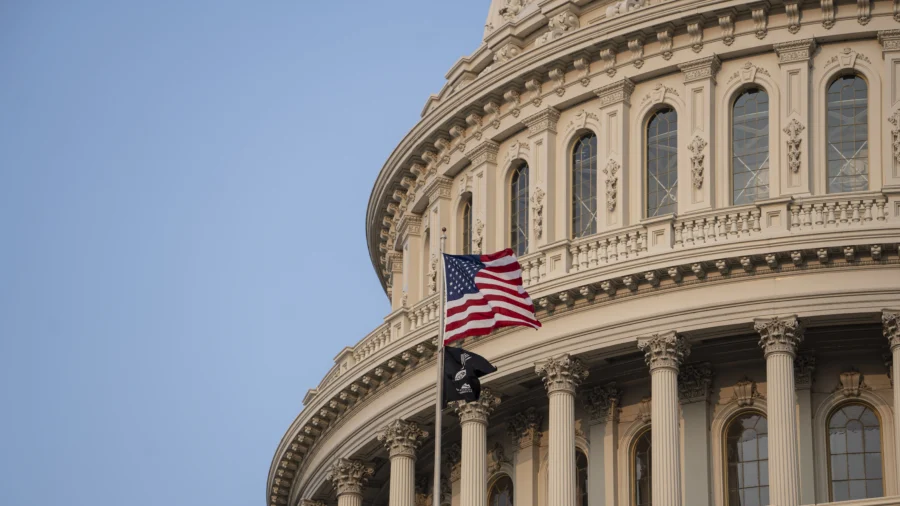With a potential government shutdown looming, Speaker Mike Johnson (R-La.) is under pressure to get deals done quickly over the next two weeks. One vote at the top of lawmakers’ minds was an emergency bill aimed at filling a nearly $3-billion spending gap for veterans’ benefits that was introduced last week by Rep. Mike Garcia (R-Calif.). The bill passed Tuesday with bipartisan support.
It will now head to the Senate and is expected to be passed quickly. The enactment of this legislation would ensure there would be no delays in the benefit payments that 7 million veterans are at risk of losing on Sept. 20.
“Millions of veterans were about to lose their benefits, and that’s unacceptable,” Garcia said in a statement after his bill passed. “We’re not just throwing money at the problem. This bill includes critical oversight measures to ensure that every dollar is spent appropriately.”
According to the federal government’s official source of spending data, the Department of Veterans Affairs has nearly $408 billion in budgetary resources or 2.8 per cent of the 2024 fiscal year budget.
Rep. Mike Bost (R-Ill.), the chairman of the House Committee on Veterans’ Affairs, said in response to Garcia’s supplemental bill on Sept. 6 that “the VA budget is serious business that has a real impact on veterans’ lives.”
If the bill somehow fails in the Senate this week, the House could then decide to vote on a separate veterans’ benefits bill, the Pay Our Troops Act, this one led by Rep. Jen Kiggans (R-Va.), which would provide continued payments specifically in the event of a government shutdown.
Kiggans is up for reelection this year in a competitive Virginia Beach race, which has large military bases. She’s looking to rack up a win for veterans as Virginia voters begin heading to the polls on Friday. She also has the support of other congressional members, like Rep. Rich McCormick (R-Ga.), a United States Marine Corps veteran who co-sponsored her bill.
“I am a proud co-sponsor of the Pay Our Troops Act to ensure that our military personnel continue to receive their pay and benefits in the event of a government shutdown,” McCormick told NTD News in a statement. “This legislation demonstrates a commitment to supporting our brave men and women in uniform and upholding our duty to care for those who sacrifice for our country.”
A loss of VA benefits risks making more veterans homeless, a phenomenon the Department of Housing and Urban Development reported increased by 7.4 percent in 2023.
The Department of Veterans Affairs is no stranger to controversy surrounding its budget. It was revealed earlier this year that the VA awarded $10.8 million in bonuses to senior executives. In 2019, it was found that the VA wasted $223 million on transport services.
In what is widely viewed as the biggest scandal in the department’s 35-year history, at least 40 veterans died in 2014 while waiting for treatment at the Phoenix Veterans Health Administration, where they were kept on secret lists used to conceal delays. These revelations led to the resignation of Eric Shinseki, the Secretary of Veterans Affairs in the Obama administration.
“It’s time for the VA to be held accountable for this severe incompetence,” Nicole Kiprilov told NTD News. Kiprilov is the executive director of the Coalition for Military Excellence, a nonprofit dedicated to increasing public awareness of military policies it believes are damaging the armed forces.
Despite the 2023 increase in more veterans being homeless, veteran housing has generally been trending in a positive direction in the United States over the last 14 years, with veteran homelessness having decreased by 52 percent since 2010, according to the HUD report.
Lawmakers on Tuesday also voted on the No Foreign Election Interference Act, which failed to secure the two-thirds vote needed. The act, which would have penalized tax-exempt organizations who’ve received foreign funding from making PAC donations, was voted down by prominent Democrats like Rep. Alexandria Ocasio-Cortez (D-N.Y.), former Speaker Nancy Pelosi (D-Calif.), and Minority Leader Hakeem Jeffries (D-N.Y.).

